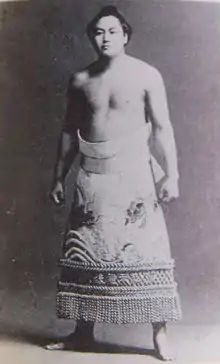Tenryū Saburō
Tenryū Saburō, (November 1, 1903 – August 20, 1989) born Saburō Wakuta in Shizuoka Prefecture, Japan, was a professional sumo wrestler with the Dewanoumi stable. As the ringleader of the "Shunjūen Incident", in which many wrestlers went on strike, he left the Japan Sumo Association in 1932. With the other striking wrestlers, he created the "Rishiki group for a Great Japan", wishing to reform the system he described as "feudal" and to increase his earnings. Because of financial difficulties, the group dissolved in 1937.
| Tenryū Saburō | |
|---|---|
| 天竜 三郎 | |
 | |
| Personal information | |
| Born | Saburō Wakuta November 1, 1903 Shizuoka prefecture, Japan |
| Died | August 20, 1989 (aged 85) |
| Height | 1.87 m (6 ft 1 1⁄2 in) |
| Weight | 116 kg (256 lb) |
| Career | |
| Stable | Dewanoumi |
| Record | 171-85-18-6 draws |
| Debut | May 1920 |
| Highest rank | Sekiwake (May 1930) |
| Retired | January 1932 |
| Championships | 1 (Jūryō), 1 (Sandanme) |
In 1939, he invited teachers of Japanese martial arts to Manchuria. He discovered the Aiki-Budo of Morihei Ueshiba and became his student the same day.
In 1957, the reforms Saburō had supported were implemented, and he was invited to talk as a witness.
Career record
| - | Spring Haru basho, varied |
Summer Natsu basho, varied |
|---|---|---|
| 1920 | (Maezumo) | East Jonokuchi #18 0–0–5 |
| 1921 | East Jonokuchi #11 1–2–2 |
East Jonokuchi #9 2–2 1d |
| 1922 | East Jonidan #26 4–1 |
West Sandanme #27 1–3 1d |
| 1923 | East Sandanme #40 6–3 1d |
East Sandanme #18 4–2 |
| 1924 | East Sandanme #4 4–0 1d Championship |
East Makushita #14 4–2 |
| 1925 | East Makushita #3 3–3 |
West Makushita #5 2–3 1d |
| 1926 | West Makushita #9 4–2 |
West Makushita #5 2–4 |
| - | Spring Haru basho, Tokyo |
March Sangatsu basho, varied |
Summer Natsu basho, Tokyo |
October Jūgatsu basho, varied | ||
|---|---|---|---|---|---|---|
| 1927 | East Makushita #19 5–1 |
East Makushita #19 5–1 |
East Jūryō #10 3–3 |
West Jūryō #10 6–5 |
||
| 1928 | East Jūryō #10 10–1 Championship |
East Jūryō #2 7–4 |
West Maegashira #13 9–2 |
West Maegashira #13 8–3 |
||
| 1929 | East Maegashira #2 0–0–11 |
East Maegashira #2 6–5 |
East Maegashira #6 8–3 |
East Maegashira #6 6–5 |
||
| 1930 | East Maegashira #1 7–4 |
East Maegashira #1 10–1 |
East Sekiwake 6–4 |
East Sekiwake 8–3 |
||
| 1931 | West Sekiwake 8–3 |
West Sekiwake 8–3 |
East Sekiwake 6–5 |
East Sekiwake 8–3 |
||
| 1932 | West Sekiwake – Expelled |
|||||
| Record given as win-loss-absent Top Division Champion Top Division Runner-up Retired Lower Divisions Key:d=Draw(s) (引分); h=Hold(s) (預り) | ||||||
References
| Wikimedia Commons has media related to Tenryū Saburō. |
- "Tenryu Saburo Rikishi Information". Sumo Reference. Retrieved 2013-07-12.